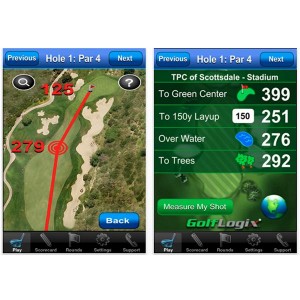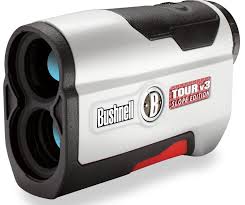GPS vs. Rangefinders: The Full Lowdown on Both
The Author: NMBG StaffPublished: November 25th, 2013
Last Updated: October 5th, 2022
In this day and age, every golfer is looking for an advantage over the course or a fellow golfer. In the past 7 years, there have been tremendous advances in the game of golf from a technological standpoint. Not only do clubs allow golfers to hit the ball farther, but the ball is traveling longer distances than ever before.
The main advantage to the golfer is being able to find the accurate distance to the hole. Have you ever watched a professional tournament on t.v. and seen a player just walk up to the ball and hit it? Of course not. When they hit their shot, they know the exact distance, wind direction, and elevation. Obviously, they have the luxury of a caddy. Amateur golfers on the other hand need to rely on other ways to improve their game. This started the competition between GPS and rangefinder companies.
Companies such as Golf Logic try to put this information in the average golfer’s hands via GPS. Apps can easily be downloaded for free or yearly fees on most smartphones and can give the novice golfer an overview of the hole as well as any bunkers, water, hazards, etc. that is between their ball and the hole. In addition, it gives a somewhat accurate distance to the green. Many courses today have golf carts equipped with GPS to help speed play as well as promote items in the clubhouse and pro shops. Courses that have newer advanced GPS systems can keep golfers updated on national sporting events, weather, and even stock market changes. However, there are disadvantages to the hand-held GPS. The average golfer may not need all of the fancy gadgets to score 90 on a course. He may lose focus on his game and think he can make an extremely difficult shot when in reality he should just hit a safe shot, make par or bogey, and move onto the next hole.
While some prefer the technology of GPS, others tend to favor the simplicity of a rangefinder. Rangefinders vary in price and functionality. Leading manufacturers such as Bushnell and Leupold have models ranging anywhere from $200 to $500. The main advantage is that these devices can also be used off the course while practicing or for activities such as hunting and target shooting. Bushnell’s newest rangefinder, the Tour V-3 Slope Edition, comes equipped with JOLT technology which sends micropulses when the exact target is acquired. This eliminates all doubt a player has when hitting a shot. Disadvantages of the rangefinder is that it is only accurate for direct line of sight. If you’re playing a hole that is a dogleg right and the flag is blocked out by trees, then you cannot get an accurate reading. As is the case with GPS, a rangefinder does not allow you to see any hazards that may be between you and the target.
Regardless of preference, these devices make yardage books obsolete. Golf courses often undergo renovations or modifications which makes their yardages books inaccurate. A simple device like GPS or a rangefinder eliminates any inaccuracy.
If I were asked which device I prefer, my answer would most definitely be a rangerfinder due to its convenience and precision. However, if GPS is available, I will also use that in order to obtain the most accurate information to hit my upcoming shot.






